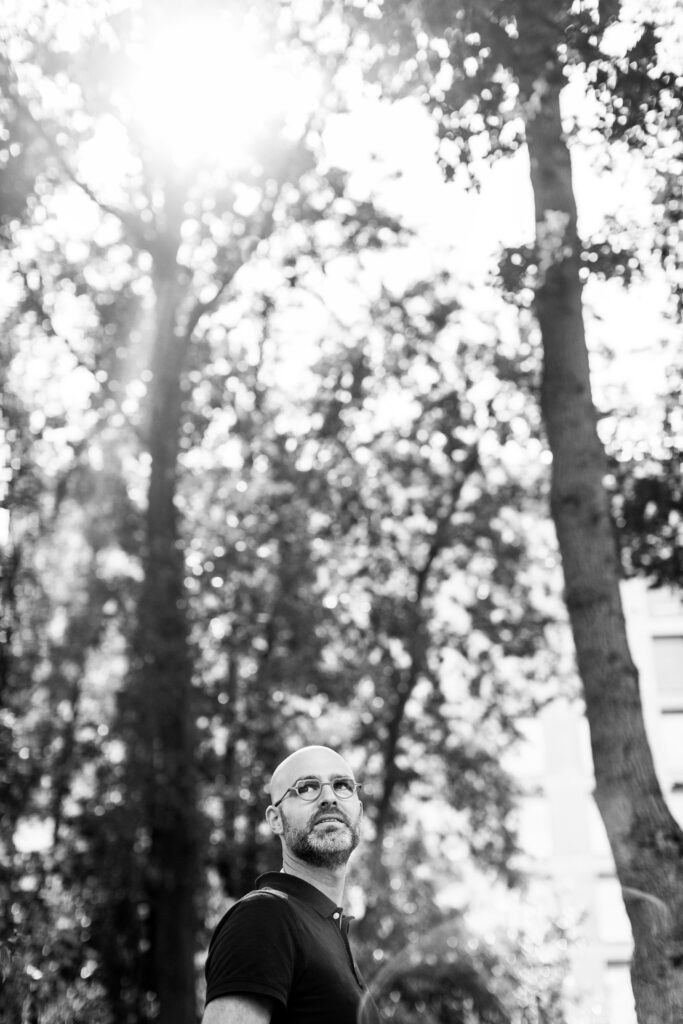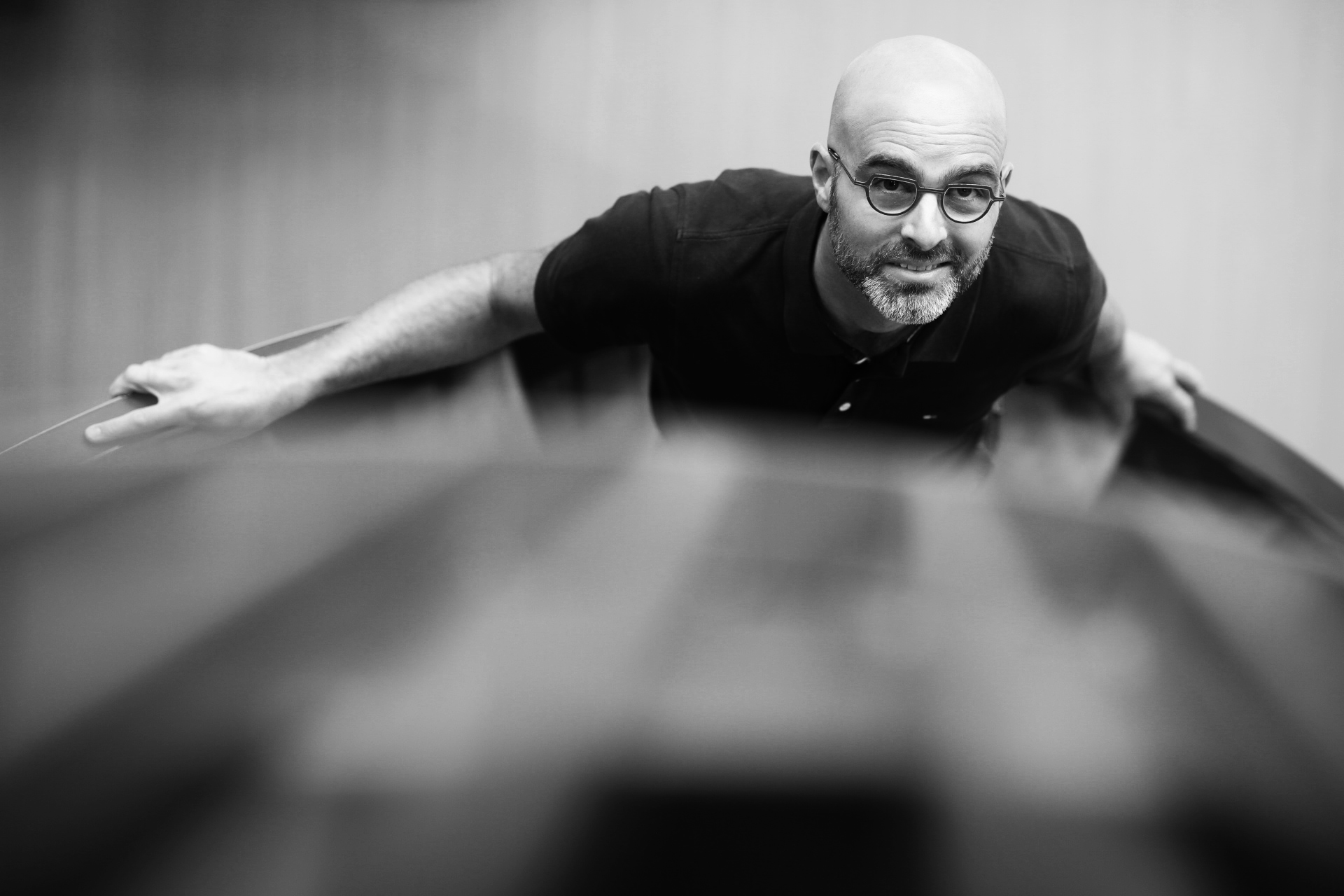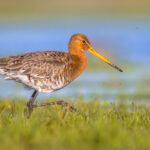Behind the successful scientist is a modest man who never loses sight of the importance of his team.
His PhD students and postdocs say he is always ready to help them. Whether it is Monday morning or Saturday night, they never have to wait long for a response to an email or a WhatsApp message. Resource put him to the test and, indeed, there was an answer from Professor Weijers within two hours. An interview on Saturday morning? No problem.
I never take success for granted
In true Covid-proof style, we made a Skype appointment. ‘I’m fed up with working at home now,’ says Weijers from his home office. ‘Not for myself, but I am noticing that it creates a barrier for the people in my group. Normally they just drop in at my office to consult me or have a little chat, and that has disappeared during the coronavirus crisis.’ So now Weijers is spending time on a regular basis at the laboratory, close to the action and the plants.
Where did your dedication to plants come from?
‘I’m afraid I don’t have a nice story about how I walked through the fields with my grandad as a little boy and thought, “I’ve got to understand these plants.” My interest only developed during my Applied Sciences degree in Laboratory Science, when I did an internship in Wageningen in a group that was studying plants. Then I realized how little is known still about the plant world. Processes that we’ve known about in detail in humans and animals, are still unexplored in these green beings. Because there are still so many unanswered questions in plant biology, I saw the potential for making a real difference in that discipline. In the years that followed, I came in contact with other interesting disciplines where there was still a lot to be discovered too, but I never felt the urge to switch subject areas.’
I wasn’t really motivated at secondary school
Applied Sciences? Not what you expect of a chair-holding professor.
‘I wasn’t really motivated at secondary school. That changed when I started my Applied Sciences degree: I was fascinated by Biology and Biochemistry. It woke something up in me. So much so that I thought about transferring to a more theoretical university, but I decided to finish my Applied Sciences degree because I wanted a good experimental foundation. I could always transfer to another university after that.’
But you didn’t do that. After your first degree you went straight on to doctoral research, without getting a Master’s first.
‘That is indeed unusual, but I thought: “What I really want to do is research. So why not give it a go?” I applied for two PhD positions, one in Wageningen and one in Leiden. Wageningen rejected me because I didn’t meet the entrance requirements. Luckily I was accepted as a PhD student at the University of Leiden. That way I could skip a couple of years.’
Getting my PhD so young was formative
In spite of the rejection by WUR, you came to Wageningen to lead a group. No hard feelings?
‘Oh no, that sort of thing is purely a business matter. Although years later I did confront the person who made the decision with the rejection. With a grin, of course.’
What was it like to do doctoral research with less experience than your colleagues?
‘I was only 20 when I started on my PhD. And yes, you do feel a bit of an underdog among other PhD students who’ve been studying for longer. In retrospect, this situation was good for me. I didn’t take it for granted that I would complete my PhD research successfully, and I never just assumed I would be successful in the next stage of my career. At every stage I thought, “I’m going to try and do this as well as possible and then I’ll see whether I manage.” That attitude worked for me, and has stayed with me throughout my career: a modesty about my own capacities. So getting my PhD so young was formative for my professional personality and I see that as an advantage.’
A doctor at 26, the youngest professor at WUR, an ERC starting grant in 2011, a VICI grant in 2015, another ERC grant in 2019, teacher of the year in 2013, and last year membership of the European Molecular Biology Organization EMBO for ground-breaking research. What is your secret?
‘If you sum it up like that, it does sound rather impressive. But at each point, it’s all about a single grant or a single publication. And these things have their own momentum: if you get a nice grant at the start of your career, it looks good on your CV, which give you a better chance of a second grant. I think if you are successful once, it is easier to go on being successful.’
As a scientist you have to keep on reinventing yourself
But you do have to do something well.
‘The attitude I already mentioned played an important role, I think. Because I never just assume that an idea is right, that I can do it, or that my research will be successful, I always give it everything I’ve got. And secondly, I’m not driven by the motive of achieving successes myself. The university and the research we do are vehicles for educating students and junior researchers. I always bear that in mind, and that’s where I get my energy from.’

What tips would you give someone who wants to follow in your footsteps?
‘As a scientist, you must keep on developing and reinventing yourself and your research. Do you dare to tackle new questions and subjects, and adopt new methods from other research fields? By that I don’t mean that you launch a completely new research project that is unrelated to previous topics, but an issue that takes you in a slightly different direction. That has been crucial in my career. But you do run the risk of that sort of thing being a total failure.’
Have you ever had a total failure?
‘Not a total failure, no. Of course, some studies have not gone the way I hoped they would, but the trick is to round off the research properly anyway. Then the researcher who worked on the project can still take the next career step. And even if the results are not a huge breakthrough, new insights still take the discipline a step further.’
I’m still fascinated by how such a simple little substance can regulate so many different processes
It is noticeable that you dare to tackle new topics. In recent years you have researchers, hormones, embryo development, stem cells and evolution. Do you get bored easily?
‘Things hold my interest for a very short time, yes. That was always the case. When I was a child it could be problematic but in the sciences I see its advantages. I am always looking for new research questions that can enable us to take the research in a new direction. I find setting up something new more exciting than keeping it going. That goes for research, but also for activities and events. I was involved in setting up the Science Café in Wageningen. I really enjoyed doing that, but I’m not the person who then keeps it going for years or revives it.
But you did work on the plant hormone auxin for nearly 25 years. Why is that so exceptional?
‘Auxin has been an exception, it’s true. The funny thing about it is that there is not much to this hormone in molecular terms: it’s a simple little molecule. And yet that one simple little substance regulates nearly everything in plants, from their growth to the formation of flowers. I see it as the miracle of the plant world. I’m still fascinated by how such a simple little substance can regulate so many different processes. And even though scientists have been doing research on it for over a century, we still don’t know anything like all its secrets.’
I’m not the right person to look for applications. I’m not good at it and I’m not seriously interested in it
That is a fairly fundamental research question. Can we do anything useful with plant hormones too?
‘A lot of technological applications we see around us now stem from knowledge gained from fundamental research. Plant breeders apply knowledge about the growth of plants in the breeding of crops. So there is sure to be a nice application for the knowledge on auxin. Only I’m not the right person to go looking for that application. That’s not my strong point, and I’m not seriously interested in it. My strength lies in fundamental questions about how processes work. I leave thinking up an application to my fellow-researchers who do know about that.’
What have you got planned now?
‘At the moment I’m working on cell polarity. I want to find out how a plant cell knows where it is in the plant, and how it knows which way is up, down, inside and outside. We have recently started a big project which we hope will provide an answer to these questions.’
Dolf Weijers (b.1976, Grootegast, Nederland)
| 1993-1997 | Applied Sciences degree in Laboratory Science, Enschede |
| 1997-2002 | PhD at the University of Leiden |
| 2002-2005 | EMBO Postdoc at the University of Tübingen, Germany |
| 2006-2007 | Junior group leader at Wageningen University |
| 2008-2012 | Associate professor at Wageningen University |
| 2011 | ERC Starting Grant |
| 2012-2017 | Personal professor of the Biochemistry of Plant Development at Wageningen University |
| 2013 | Teacher of the Year |
| 2015 | VICI grant |
| 2016 | VIDI grant |
| 2017-present | Professor of Biochemistry at Wageningen University |
| 2019 | ERC Advanced Grant |
| 2020 | EMBO membership |
Dolf Weijers is editor-in-chief of the journal Plant Reproduction and editor of the journal The Plant Cell, as well as a board member of the International Plant Growth Substances Association (IPGSA), the International Association for Sexual Plant Reproduction Research (IASPRR) and the Dutch Society for Developmental Biology (DSDB). He lives in Wageningen with his wife and two daughters (15 and 14).

 Dolf Weijers. Photo: Duncan de Fey
Dolf Weijers. Photo: Duncan de Fey 

